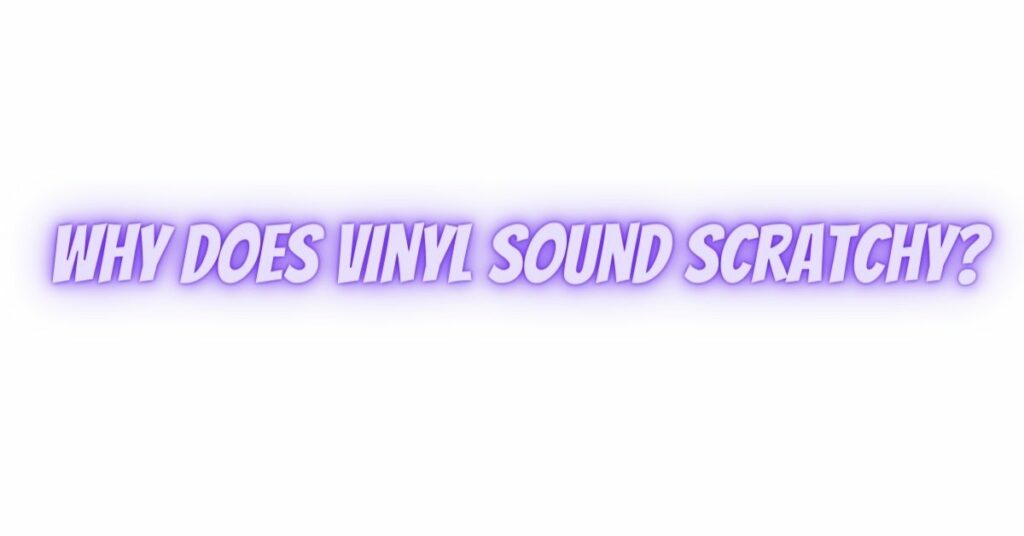Vinyl records, with their warm, analog sound, have maintained a devoted following among audiophiles and music enthusiasts. While vinyl offers a unique listening experience, some records may exhibit a “scratchy” or noisy quality. In this comprehensive article, we will delve into the reasons behind the scratchy sound often associated with vinyl records and explore potential solutions to mitigate this issue.
Understanding the Scratchy Sound
The term “scratchy” in the context of vinyl records refers to the presence of background noise, pops, clicks, and other imperfections that can disrupt the smooth playback of a record. These noises can detract from the overall listening experience, affecting the clarity and fidelity of the music. Various factors contribute to the scratchy sound:
- Surface Contaminants: Dust, dirt, and debris on the record’s surface can create noise as the stylus moves through the grooves. The stylus may pick up and reproduce these particles as unwanted noise.
- Groove Wear: Over time, the friction of the stylus in the record’s grooves can wear down the vinyl, leading to increased surface noise. This wear may be more pronounced on well-loved or heavily played records.
- Scratches and Scuffs: Physical damage to the record’s surface, such as scratches or scuffs, can result in audible imperfections during playback. These imperfections may cause pops and clicks as the stylus encounters them.
- Static Electricity: Static electricity can build up on the record’s surface, attracting dust and dirt and exacerbating the problem of surface contaminants. This can lead to noisy playback.
- Stylus Condition: The condition of the stylus (needle) itself is crucial to the quality of playback. A worn or damaged stylus may exacerbate surface noise issues.
- Poor Pressing or Manufacturing: Low-quality vinyl pressings or manufacturing defects can result in increased surface noise and imperfections, making some records inherently scratchier than others.
Solutions to Mitigate Scratchy Sound
While some degree of surface noise is inherent to vinyl records, you can take steps to minimize the scratchy sound and improve the listening experience:
- Proper Cleaning: Regularly clean your records before playback to remove dust, dirt, and debris. Using an anti-static brush, microfiber cloth, or a dedicated record cleaning machine can help maintain a clean playing surface.
- High-Quality Turntable and Cartridge: Invest in a high-quality turntable and cartridge to ensure precise tracking and playback. A well-calibrated system can minimize noise and surface imperfections.
- Stylus Maintenance: Keep your stylus in good condition by cleaning it regularly and replacing it when worn or damaged. A worn stylus can damage your records and exacerbate surface noise.
- Vinyl Cleaning Solutions: Utilize vinyl cleaning solutions that are specifically designed to remove contaminants and static electricity from the record’s surface. Follow manufacturer recommendations for safe usage.
- Storage and Handling: Store your records vertically in anti-static inner sleeves and outer protective jackets to prevent physical damage and limit exposure to dust and contaminants.
- Careful Playback: Gently lower and lift the tonearm to prevent further groove wear, and ensure that your records are free of debris before playing them.
- Upgrade Vinyl Pressings: When possible, consider acquiring high-quality reissues or remastered versions of your favorite albums, as these are often produced with greater attention to sound quality and fidelity.
Conclusion
The scratchy sound commonly associated with vinyl records is often a result of various factors, including surface contaminants, groove wear, physical damage, static electricity, stylus condition, and vinyl pressing quality. By following best practices for cleaning, maintaining your equipment, and handling records with care, you can significantly reduce surface noise and enjoy a smoother, more faithful listening experience with your vinyl collection. While some imperfections may always be present in vinyl playback, proper care and maintenance can enhance your enjoyment of this cherished analog format.


